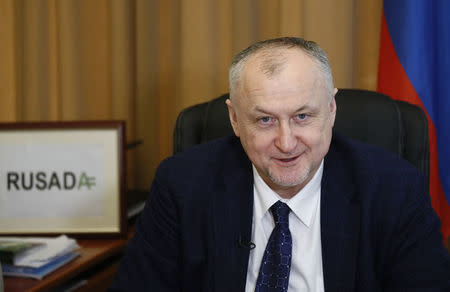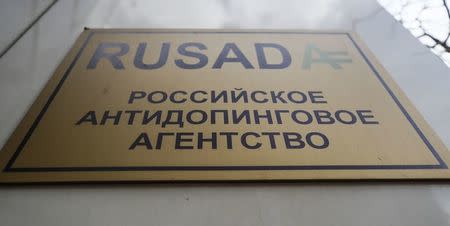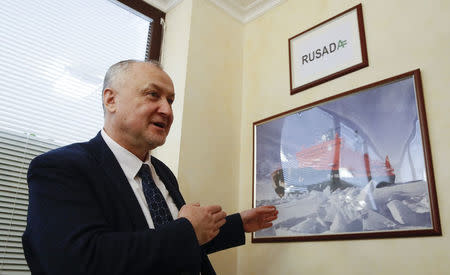Despite hurdles, Russian anti-doping agency strives toward return
By Gabrielle Tetrault-Farber MOSCOW (Reuters) - When Yuri Ganus settled into his new office last year as the director of RUSADA, Russia's suspended anti-doping agency, he hung a picture of an icebreaker plowing through blocks of ice. It serves a reminder of the agency's daunting mission: to shatter years of mistrust over allegations of state-sponsored doping and restore international belief in Russian sport. Since RUSADA was suspended in 2015 over a World Anti-Doping Agency (WADA) report outlining evidence of state-backed, systematic doping in Russian athletics, the agency has replaced 90 percent of its staff. The agency is adding some 100 new drug testers from next month, said Ganus, an ex-university lecturer whose appointment was overseen by international experts as required by WADA. But despite having pleased WADA with its recent progress, RUSADA finds itself at an apparent impasse. The two outstanding criteria for its reinstatement are out of its hands and Ganus does not see a solution any time soon. With new ministers expected to be named after President Vladimir Putin was reelected for a fourth term this month, Ganus said he did not expect any substantial changes in the Russian position in time for WADA's next foundation board meeting in May, where RUSADA's progress will be addressed. "I would really like to be wrong about this," said Ganus, whose outspoken views are somewhat unusual for a Russian sports official. "The main problem is one of understanding about how we will resolve this situation. There are very different approaches." For RUSADA to regain accreditation, Russian authorities must acknowledge the findings of a WADA-commissioned report that found more than 1,000 Russian athletes benefited from a state-run scheme to conceal positive tests over a five-year period. Russia has vehemently denied the allegations. "POLITICAL PRESSURE" The authorities must also provide access to urine samples at the suspended Moscow anti-doping laboratory. RUSADA does not have access to the lab, and the samples are under the control of Russia's Investigative Committee, the state body that handles major crimes and is investigating the doping allegations. In the circumstances, all RUSADA can do is serve as a facilitator between the parties involved in Russia's rehabilitation, Ganus said. "It's easy to lose trust and it takes a long time to get it back," he told Reuters. "The situation unfolded in such a way that made the current problem drag on." In another blow for his program of renewal, two Russians, a curler and a bobsledder, tested positive for banned substances at last month's Pyeongchang Olympics where the country's athletes competed as neutrals, punishment for allegations that the sporting powerhouse systematically manipulated doping tests at the 2014 Games in the Russian city of Sochi. Ganus was undeterred, saying the agency has sent a doping control officer to Kenya where Russian track and field athletes were training. "Athletes need to understand that we will be where they don't expect us," Ganus said. "We will be everywhere." Ganus' position on the doping scandal clashes with that of the authorities. Russian state media and the country's authorities, including Putin, have depicted the scandal as a Western-backed political conspiracy aimed at demeaning the country. This approach, Ganus said, has hindered efforts to have the suspensions against RUSADA, the country's athletics federation and Paralympic Committee lifted. "Everybody is trying to portray this as being some kind of political pressure on Russia, making parallels with other sanctions and other things," Ganus said. "This has nothing to do with political pressure." Ganus said the country's blanket denial of accusations without presenting strong arguments to defend its case had thwarted progress. "If there are allegations against you, it's important to work on them right away," he said. "If we deny everything and don't try to prove anything ... then what can we talk about?" (Editing by Alison Williams)









